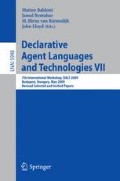Abstract
The specification and monitoring of conditional obligations and prohibitions with starting points and deadlines is a crucial aspect in the design of open interaction systems. In this paper we regard such obligations and prohibitions as cases of social commitment, and propose to model them in OWL, the logical language recommended by the W3C for Semantic Web applications. In particular we propose an application-independent ontology of the notions of social commitment, temporal proposition, event, agent, role and norms that can be used in the specification of any open interaction system. We then delineate a hybrid solution that uses the OWL ontology, SWRL rules, and a Java program to dynamically monitor or simulate the temporal evolution of social commitments, due to the elapsing of time and to the actions performed by the agents interacting within the system.
Access this chapter
Tax calculation will be finalised at checkout
Purchases are for personal use only
Preview
Unable to display preview. Download preview PDF.
References
Artikis, A., Sergot, M., Pitt, J.: Animated Specifications of Computational Societies. In: Castelfranchi, C., Johnson, W.L. (eds.) Proceedings of the 1st International Joint Conference on Autonomous Agents and Multi-Agent Systems (AAMAS 2002), pp. 535–542. ACM Press, New York (2002)
Berges, I., Bermúdez, J., Goñi, A., Illarramendi, A.: Semantic web technology for agent communication protocols. In: Bechhofer, S., Hauswirth, M., Hoffmann, J., Koubarakis, M. (eds.) ESWC 2008. LNCS, vol. 5021, pp. 5–18. Springer, Heidelberg (2008)
Bradshaw, J., Beautment, P., Breedy, M., Bunch, L., Drakunov, S., Feltovich, P., Hoffman, R., Jeffers, R., Johnson, M., Kulkarni, S., Lott, J., Raj, A., Suri, N., Uszok, A.: Making agents acceptable to people, pp. 355–400. Springer, Heidelberg (2004)
Bräuer, M., Lochmann, H.: An ontology for software models and its practical implications for semantic web reasoning. In: Bechhofer, S., Hauswirth, M., Hoffmann, J., Koubarakis, M. (eds.) ESWC 2008. LNCS, vol. 5021, pp. 34–48. Springer, Heidelberg (2008)
da Silva1, V.T.: From the specification to the implementation of norms: an automatic approach to generate rules from norms to govern the behavior of agents. Autonomous Agents and Multi-Agent Systems 17(1), 113–155 (2008)
Dastani, M., Grossi, D., Meyer, J.-J., Tinnemeier, N.: Normative multi-agent programs and their logics. In: Boella, G., Noriega, P., Pigozzi, G., Verhagen, H. (eds.) Normative Multi-Agent Systems, Germany. Dagstuhl Seminar Proceedings, vol. 09121. Schloss Dagstuhl - Leibniz-Zentrum fuer Informatik, Dagstuhl (2009)
Donini, F.M., Lenzerini, M., Nardi, D., Schaerf, A., Nutt, W.: An epistemic operator for description logics. Artificial Intelligence 200(1-2), 225–274 (1998)
Felicissimo, C., Briot, J.-P., Chopinaud, C., Lucena, C.: How to concretize norms in NMAS? An operational normative approach presented with a case study from the television domain. In: International Workshop on Coordination, Organization, Institutions and Norms in Agent Systems (COIN@AAAI 2008), 23rd AAAI Conference on Artificial Intelligence, Chicago, IL, Etats-Unis. AAAI Press, Menlo Park (2008)
Fornara, N., Colombetti, M.: Specifying and enforcing norms in artificial institutions. In: Baldoni, M., Son, T.C., van Riemsdijk, M.B., Winikoff, M. (eds.) DALT 2008. LNCS (LNAI), vol. 5397, pp. 1–17. Springer, Heidelberg (2009)
Fornara, N., Colombetti, M.: Specifying Artificial Institutions in the Event Calculus. In: Handbook of Research on Multi-Agent Systems: Semantics and Dynamics of Organizational Models of Information science reference, ch. XIV, pp. 335–366. IGI Global (2009)
Fornara, N., Viganò, F., Colombetti, M.: Agent communication and artificial institutions. Autonomous Agents and Multi-Agent Systems 14(2), 121–142 (2007)
Fornara, N., Viganò, F., Verdicchio, M., Colombetti, M.: Artificial institutions: A model of institutional reality for open multiagent systems. Artificial Intelligence and Law 16(1), 89–105 (2008)
García-Camino, A., Rodríguez-Aguilar, J.A., Sierra, C., Vasconcelos, W.: Constraint rule-based programming of norms for electronic institutions. Autonomous Agents and Multi-Agent Systems 18(1), 186–217 (2009)
Governatori, G., Rotolo, A.: How do agents comply with norms? In: Boella, G., Noriega, P., Pigozzi, G., Verhagen, H. (eds.) Normative Multi-Agent Systems, Dagstuhl, Germany. Dagstuhl Seminar Proceedings. Schloss Dagstuhl - Leibniz-Zentrum fuer Informatik, Germany (2009)
Lam, J.S.-C., Guerin, F., Vasconcelos, W., Norman, T.J.: Representing and reasoning about norm-governed organisations with semantic web languages. In: Sixth European Workshop on Multi-Agent Systems Bath, UK, December 18-19 (2008)
López, F., López, Luck, M., d’Inverno, M.: A Normative Framework for Agent-Based Systems. In: Proceedings of the First International Symposium on Normative Multi-Agent Systems, Hatfield (2005)
Sirin, E., Parsia, B., Grau, B.C., Kalyanpur, A., Katz, Y.: Pellet: A practical owl-dl reasoner. Web Semantics: Science, Services and Agents on the World Wide Web 5(2), 51–53 (2007)
Uszok, A., Bradshaw, J.M., Lott, J., Breedy, M., Bunch, L., Feltovich, P., Johnson, M., Jung, H.: New developments in ontology-based policy management: Increasing the practicality and comprehensiveness of kaos. In: IEEE International Workshop on Policies for Distributed Systems and Networks, pp. 145–152 (2008)
Yolum, P., Singh, M.: Reasoning about commitment in the event calculus: An approach for specifying and executing protocols. Annals of Mathematics and Artificial Intelligence 42, 227–253 (2004)
Author information
Authors and Affiliations
Editor information
Editors and Affiliations
Rights and permissions
Copyright information
© 2010 Springer-Verlag Berlin Heidelberg
About this paper
Cite this paper
Fornara, N., Colombetti, M. (2010). Ontology and Time Evolution of Obligations and Prohibitions Using Semantic Web Technology. In: Baldoni, M., Bentahar, J., van Riemsdijk, M.B., Lloyd, J. (eds) Declarative Agent Languages and Technologies VII. DALT 2009. Lecture Notes in Computer Science(), vol 5948. Springer, Berlin, Heidelberg. https://doi.org/10.1007/978-3-642-11355-0_7
Download citation
DOI: https://doi.org/10.1007/978-3-642-11355-0_7
Publisher Name: Springer, Berlin, Heidelberg
Print ISBN: 978-3-642-11354-3
Online ISBN: 978-3-642-11355-0
eBook Packages: Computer ScienceComputer Science (R0)

